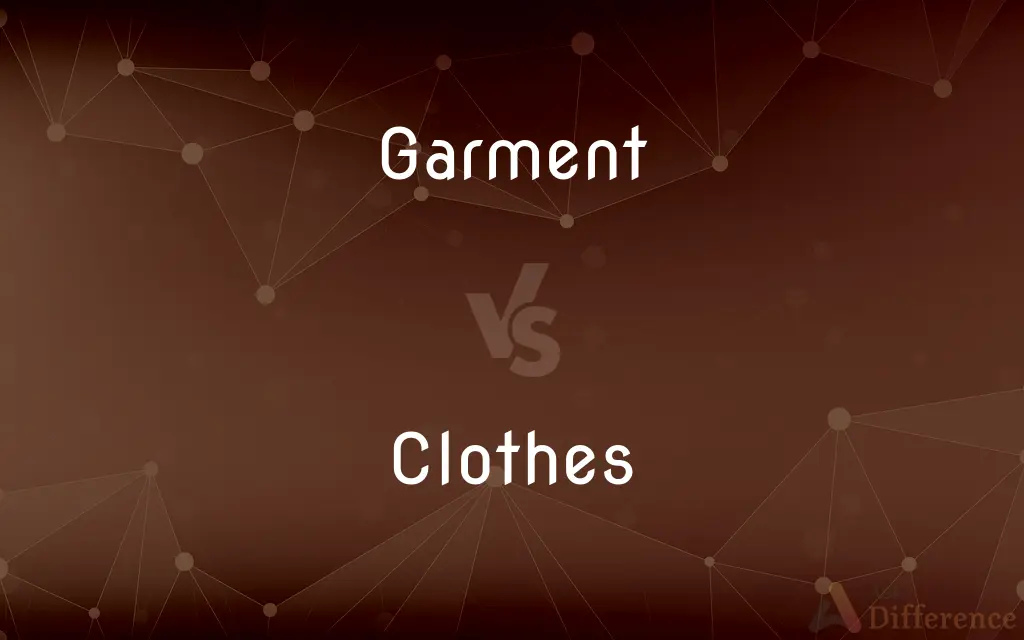Garment vs. Clothes — What's the Difference?
By Tayyaba Rehman & Fiza Rafique — Updated on March 22, 2024
Garment refers to a single piece of clothing, while clothes encompass all items worn on the body.

Difference Between Garment and Clothes
Table of Contents
ADVERTISEMENT
Key Differences
A garment is a single piece of clothing, such as a shirt, skirt, or jacket, crafted for a specific purpose or function. It emphasizes the individual item, often with attention to its design, fabric, or use. For example, a wedding dress is a garment with significant cultural and personal value. Clothes, on the other hand, refer to articles of dress in general or collectively. This term encompasses all items worn on the body, including shirts, pants, dresses, and outerwear. Clothes are essential for protection, modesty, and expression of personal style. They can range from casual attire to formal outfits.
When discussing manufacturing or fashion design, "garment" highlights the individual item's construction and material. Designers and manufacturers often use this term to focus on the specifics of clothing production, such as fabric choice, stitching, and finishing. In everyday language, "clothes" is the more commonly used term, relating to the practical and everyday aspect of dressing. It's a broad term that covers everything one might wear, from undergarments to coats, reflecting personal choices and societal norms.
Garments can be distinguished by their specific types and uses, such as athletic wear, formal wear, or work uniforms. This classification underscores the variety within the clothing industry and the specialized functions of different pieces. Clothes, by encompassing a wide range of items, underscore the diversity of human culture and the social significance of dressing. They reflect not only personal taste but also cultural identity, social status, and even political statements, serving as a universal aspect of human life.
The term "garment" often implies a level of craftsmanship or attention to detail, suggesting something that might be tailor-made or of higher quality. It's associated with the fashion and textile industries, where the focus is on design and fabrication. "Clothes," encompassing everything from daily wear to special occasion outfits, highlight the practical side of what we wear. They represent the collective ensemble of items chosen for comfort, function, or style, shaping our interaction with society and the environment.
Comparison Chart
Definition
A single piece of clothing
Articles of dress worn on the body, collectively
ADVERTISEMENT
Focus
Individual item's design, fabric, or use
General or collective term for what is worn
Usage Context
Fashion design, manufacturing, specific discussion
Everyday language, broad context
Examples
Dress, jacket, trousers
Includes all items like shirts, pants, dresses, coats
Associated Terms
Tailoring, design, craftsmanship
Comfort, style, personal choice, cultural identity
Compare with Definitions
Garment
Associated with the fashion industry.
The latest garment collection showcases sustainable fabrics.
Clothes
General term for items worn on the body.
She packed her clothes for the trip.
Garment
Crafted for specific occasions.
A baptismal garment is often white.
Clothes
Essential for protection and modesty.
Clothes protect us from the elements.
Garment
Focus on design and material.
The garment featured intricate lace details.
Clothes
Reflects personal style and identity.
Her clothes always included vibrant colors.
Garment
Can be tailor-made or off-the-rack.
He prefers custom garments for formal events.
Clothes
Varies across cultures.
Traditional clothes often have cultural significance.
Garment
An article of clothing.
Clothes
Includes casual and formal wear.
His clothes ranged from jeans to business suits.
Garment
To clothe; dress.
Clothes
Items worn to cover the body
He stripped off his clothes
Baby clothes
A clothes shop
Garment
A single item of clothing.
Clothes
Bedclothes
Rosie got into bed and pulled the clothes up to her nose
Garment
(figurative) The visible exterior in which a thing is invested or embodied.
Clothes
(plural only) Items of clothing; apparel.
Garment
(Mormonism) temple garment
Clothes
(obsolete) cloth.
Garment
(transitive) To clothe in a garment.
Clothes
The covering of a bed; bedclothes.
Garment
Any article of clothing, as a coat, a gown, etc.
No man putteth a piece of new cloth unto old garment.
Clothes
Laundry (hung on a clothesline).
Garment
An article of clothing;
Garments of the finest silk
Clothes
Covering for the human body; dress; vestments; vesture; - a general term for whatever covering is worn, or is made to be worn, for decency or comfort.
She . . . speaks well, and has excellent good clothes.
If I may touch but his clothes, I shall be whole.
Garment
Provide with clothes or put clothes on;
Parents must feed and dress their child
Clothes
The covering of a bed; bedclothes.
She turned each way her frighted head,Then sunk it deep beneath the clothes.
Clothes
Clothing in general;
She was refined in her choice of apparel
He always bought his clothes at the same store
Fastidious about his dress
Common Curiosities
Can "garment" and "clothes" be used interchangeably?
Not exactly. "Garment" is more specific, while "clothes" is a broader term.
Is there a difference in formality between "garment" and "clothes"?
"Garment" can imply a higher level of formality or craftsmanship, while "clothes" is more general.
Why is the term "garment" important in the fashion industry?
It emphasizes individual pieces, focusing on design, material, and craftsmanship.
How do cultural differences affect the use of garments and clothes?
Cultural differences influence styles, types of garments, and how clothes are worn and perceived.
Can the choice of clothes affect one’s mood or confidence?
Yes, the choice of clothes can significantly affect an individual's mood, confidence, and how they are perceived by others.
What is the main difference between a garment and clothes?
A garment refers to a single piece of clothing, while clothes refer to all items worn on the body collectively.
Can a single item like a dress be considered "clothes"?
Technically, yes, but it is more accurately described as a garment.
How has the meaning of "clothes" evolved over time?
The concept of clothes has evolved with fashion trends, cultural changes, and technological advancements in textile production.
How does the choice of garments reflect personal identity?
The choice of garments can reflect personal style, cultural background, and even beliefs.
What is the significance of choosing sustainable garments and clothes?
Sustainable choices can reduce environmental impact and promote ethical practices in the fashion industry.
Are accessories considered garments or clothes?
Accessories are generally not considered garments or clothes; they are additional items that complement an outfit.
Is the term "garment" used in everyday conversation?
It's more commonly used in professional or specific contexts related to fashion and clothing design.
What role do clothes play in society?
Clothes serve practical needs, express personal and cultural identity, and can denote social status.
How can understanding garments enhance fashion design?
Understanding garments involves appreciating the intricacies of design and material, crucial for innovation in fashion.
How do technological advancements impact garment production?
Technological advancements lead to innovative fabrics and production methods, enhancing the quality and sustainability of garments.
Share Your Discovery

Previous Comparison
Urochordata vs. Cephalochordata
Next Comparison
Eternity vs. InfinityAuthor Spotlight
Written by
Tayyaba RehmanTayyaba Rehman is a distinguished writer, currently serving as a primary contributor to askdifference.com. As a researcher in semantics and etymology, Tayyaba's passion for the complexity of languages and their distinctions has found a perfect home on the platform. Tayyaba delves into the intricacies of language, distinguishing between commonly confused words and phrases, thereby providing clarity for readers worldwide.
Co-written by
Fiza RafiqueFiza Rafique is a skilled content writer at AskDifference.com, where she meticulously refines and enhances written pieces. Drawing from her vast editorial expertise, Fiza ensures clarity, accuracy, and precision in every article. Passionate about language, she continually seeks to elevate the quality of content for readers worldwide.
















































